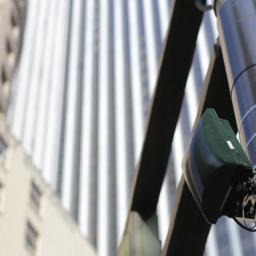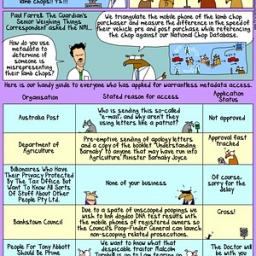DHS, the estranged megadepartment for which has suffered a series of setbacks in the last year, has once again made headlines for all the wrong reasons recently when
private information about a welfare recipient's financial affairs was released by the department in an attempt to counter the claims made about the debt recovery process used by DHS.The release of this information in this context is deemed to be
legally debatable by welfare advocates. When George Brandis was questioned about Centrelink's activities on the Q&A program he responded that people should just contact Centrelink, which caused the audience to
break out laughing as the current wait times and contact problems surrounding resolving debts issued by the Centrelink automated debt recovery system as seen by the public as being a farce.

Seattle-based KIRO 7 news team recently took a pile of brand-new computers to six Office Depot locations around Portland, Ore. Technicians at four shops claimed the PCs showed "symptoms of malware," and offered to sell repair and protection services for up to $180.
Sister station FOX25 in Boston recently ran a similar undercover report, bringing three out-of-the-box PCs to Office Max, an Office Depot Inc. affiliate. Techs at two locations suggested signs of "poor performance," recommending a fix between $149 and $199; a third store found no problems. Washington Sen. Maria Cantwell last week requested that the Federal Trade Commission investigate Office Depot Inc. for deceptive or unfair marketing practices related to these allegations.
http://www.pcmag.com/news/349821/office-depot-caught-selling-fixes-for-non-existent-pc-prob
Globalstar Inc., operator of a low Earth orbit (LEO) satellite constellation for phones, plans to open up
another Wi-Fi channel, but only for those who can pay. Globalstar's petition seeks to expand its use of the 2483.5-2495 MHz (Channel 14) band. Unlike all other Wi-Fi channels, which are open to any FCC-approved device and don't require permission, this one would be under Globalstar's control. A carrier that makes a deal with Globalstar might be able to set that channel aside for its own subscribers.
While users in some other countries have been using channel 14 for years, part of it has been set aside in the U.S. as a guard band to protect Globalstar's satellite frequencies. Most Wi-Fi devices could be easily modified via firmware upgrades to take advantage of the extra channel. The plan has come under sharp criticism during the lengthy approval process at the FCC. Microsoft, Google, the cable industry and backers of Wi-Fi and Bluetooth all have filed comments urging the agency not to approve the scheme. Tests at the FCC have shown it would interfere with Bluetooth, which already uses part of the channel. But the non-profit Public Knowledge is supporting the plan, as encouraging more competition and more public internet access options. The Globalstar proceeding has been in the works
going on three years.
The company that operates the for-profit vocational school chain ITT Technical Institute, with more than 130 campuses in 38 states (one of the country's largest) announced that it was
permanently closing all its campuses nationwide. It blamed the shutdown on the recent move by the U.S. Education Department to ban ITT from enrolling new students who use federal financial aid. Like many other for-profit college operators, ITT has faced federal and state investigations of its predatory recruiting and shady accounting practices, with up to 60% of students defaulting on loans.
The shutdown will affect about 35,000 students who were preparing for the start of classes this month. It will also cost more than 8,000 employees their jobs. Those students and others who left the school within the last 120 days would be eligible to have federal loans for their ITT education forgiven if they want to give-up any earned credits and start over at another school, Education Department officials said.
In addition to the ban on ITT's enrollment of new students who used federal aid, the U.S. Education Department also prohibited ITT from awarding its executives any pay raises or bonuses. Now, sources claim ITT Tech is
preparing to file for bankruptcy.
Rob Rhinehart, developer of the meal replacement milkshake known as Soylent,
has been criminally charged over his off-grid "experiment in sustainable living". He installed an off-grid shipping container home, without obtaining city permits, and he allegedly refused city orders in January and April to remove the container. He could face up to two years in prison and a $4,000 fine.
Rhinehart plopped down the container with no fence on a vacant lot of 8,422 square feet in Montecito Heights - an evolving hilltop community with gorgeous views of the downtown Los Angeles skyline, which property records show he bought in January for $21,300. And he was almost never there. Over time, it became a vandalized graffiti eyesore with broken windows and a magnet for unwelcome visitors who for years have flocked to the hill looking for a place to drink, make out or watch Dodger Stadium fireworks.

A U.S. Senate hearing last week examined billing practices for five major pay-TV companies serving some 71 million subscribers. Senators honed in on overcharges from Time Warner Cable and Charter Communications. Charter estimates it has annually overcharged 5,897 customers a total of $494,000 each year. "And rather than correct the mistake by refunding the overcharges,
the company just kept the money," said Sen Rob Portman.
Sen. Claire McCaskill commented: "We found that customers are being charged a host of fees that are not included in advertised pricing, some of which are for programming that used to be included in a customer's video package. We also found that, just as many customers have long believed, some of these fees, like the HD and DVR service fees, aren't a true reflection of the cost to the company of the service, but rather are based on the revenue goals of the company, and the price a customer is willing to stomach. In fact, some of these fees are charged to old customers while new customers get the same services free of charge."
"As a result of this investigation, both Time Warner Cable and Charter have taken steps to address these issues. Time Warner Cable will not, however, investigate when it began overcharging customers unless customers bring specific concerns to the company's attention, nor will it provide a full refund dating back to when the overcharge began."

Home Depot filed an antitrust lawsuit in federal court this week against credit card giants Visa and MasterCard for blocking the adoption of chip-and-PIN on credit card transactions. Instead, the companies adopted the less secure chip-and-signature method, which does not prevent lost and stolen cards from being used. Merchant groups, consumer advocacy groups and even the Federal Bureau of Investigation (FBI) called attention to the need to adopt chip-and-PIN in order to take full advantage of EMV security. According to data compiled by the U.S. Federal Reserve, transactions routed over Visa's or MasterCard's signature debit networks
cost retailers more than twice as much as transactions routed over PIN networks.
Home Depot's case against Visa and MasterCard is similar to one Walmart recently filed against Visa. In that case, Walmart says that Visa is precluding the retailer from requiring PINs on all debit card transactions. As a result, Walmart is forced to pay the fees associated with signature-based networks. For the world's largest retailer, that figure is in the billions.
Visa and MasterCard, along with groups such as the American Bankers Association, have said that requiring PINs with credit card transactions could cause confusion for consumers. Visa has also said that newer, better authentication technologies (such as biometric and geo-location verification) are just over the horizon.
Obama thinks that having a secure mobile device amounts to having a phone fetish. In another bizare move by the soon-to-be-ex president of the USA, the commandeer in chief has been quoted as being strongly against strongly encrypted mobile devices to the point where full near unbreakable, in the current computing environment, secure devices is basically people just worshipping their phone. How will we catch pedophiles? Why do we allow terrorists to get away with protecting their secrets? The US goverment must be able to access anyone's files (papers in the constitution) at any time and those who stand in the way must be wrong. How dare people walk around with a bank vault for their data that can not be easily copied.
Continued
legal issues for companies using strong encryption in their products:
Apple isn't the only company in hot water over encryption. Facebook's VP of Latin America, Diego Dzodan, was detained by police this morning in Brazil after the company failed to comply with a court order to hand over Whatsapp user data, CNN reports. The big problem: Whatsapp (which Facebook owns) fully encrypts messages between users, and it has no records of messages sent. Even if it were to get access to a specific device, the encryption is likely too difficult for the company to crack.
Regardless of whether you are a small outfit like
Lavabit or an enormous company like
Apple, the government has you in their sites if you stand up for user's privacy.

Australians love their internet. They love their phones. Their government loves to suck up all of the juicy metadata generated by all Australian internet and phone devices to store for two years. Now,
61 organizations want their metadata feeding trough back. Unhappy with the recent law changes which has denied these organizations their seat at the Australian Metadata FreeForAll Feast they have all submitted their pitch to be hooked back up to the golden river of free access to everyone's movements down to who they talk to and when.
The question I have is: Why do multiple betting and racing organizations feel that they need everyone's private communication records? To track them down to pay off debts? The rest of the list is just as strange, except perhaps for defense.
More links:
one,
two,
three,
four,
five,
six,
seven,
eight.




